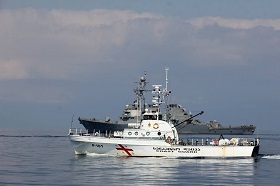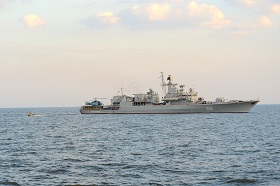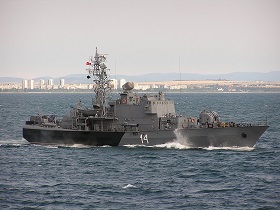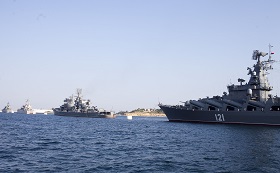On the Road to “Strategic Depth” in the Black Sea Region
(votes: 4, rating: 5) |
(4 votes) |
Ph.D. in History, Scientific Advisor of The Evgeny Primakov Center for International Cooperation, Senior Research Fellow, Center for the Arab and Islamic Studies, Institute of Oriental Studies RAS
Independent Analyst
Today, we can hardly say that the states of the Black Sea region have a complete understanding on security matters: joint exercises with all states participating have not been held since 2014. Blackseafor has essentially become defunct after Ukraine refused to take part in the group’s events. Therefore, close cooperation between the states of the Black Sea region on security matters has been suspended since 2014, but they continue to cooperate in other formats.
Today, we can also say that Russia does not pay enough attention to cooperation in the Black Sea region. Consequently, joint exercises by regional states and NATO member states without Russia’s participation have set increasingly frequent precedents. The trend for rapprochement between the North Atlantic Alliance and Black Sea region states in their efforts to maintain security is further confirmed by the latter’s official documents. With increasing frequency, they speak about the need for rapprochement between NATO and the EU (as do the documents, for instance, of Bulgaria and Romania) and taking a stand against Russia (as do the documents of Ukraine).
By ignoring the recent challenges in the Black Sea region, Russia is increasingly losing out to NATO in matters concerning influence over the region. To expand its cooperation with Bucharest, Sofia, Kiev, and Tbilisi, Russia needs to add “strategic depth” to its inter-country relations. That is, despite the political situation, work should be launched on strategic elements of the relations that would buttress security in the region. Pre-emptive measures are required to prevent the situation from deteriorating into a severe escalation and the existing conflicts from unfreezing. Working along the lines of track 2 diplomacy can offer opportunities for achieving greater understanding between the parties.
For many years, the Black Sea has been a platform for the military exercises of Black Sea region countries and their partners. For instance, in September 2018, the strategic command staff exercise Cossack Freedom — 2018 was held and involved Ukrainian troops. A few months prior, in July 2018, the joint Ukraine–US Navy exercise Sea Breeze 2018 was held in the Black Sea. In 2018, Georgia, Ukraine, France, and the US held joint exercises controlled by Romania’s Navy. The press service of Russia’s Black Sea Fleet also reports about regular exercises: on January 29, 2019, a planned drill involved the ASW corvette Kasimov entering a combat training sea range to perform training missions.
Certainly, these events have a special significance for their participants, who exchange information and expand cooperation. The Blackseafor was established for this purpose in 2001 and had Bulgaria, Romania, Russia, Turkey, Ukraine, and Georgia participate. Today, we can hardly say that the states of the Black Sea region have a complete understanding on security matters: joint exercises with the participation of all states have not been held since 2014. The Blackseafor has essentially become defunct after Ukraine refused to take part in the group’s events. Therefore, close cooperation between the states of the Black Sea region on security matters has been suspended since 2014, but they continue to cooperate in other formats.
Georgia’s policy regarding the Black Sea region has been laid out in several documents, primarily the National Security Concept of Georgia adopted in 2011. The Black Sea region and security therein are mentioned in the introduction to the document referring to the desire of Georgia’s people to become fully integrated into NATO and the EU and to contribute to maintaining security in the Black Sea region. Additionally, other parts of the Concept state that Georgia supports the integration of all Black Sea states into the European Union and the North Atlantic Alliance. According to the document, such measures will give a significant boost to the security of the Black Sea region as Europe’s south-eastern border. In particular, the Concept states that NATO is capable of providing aid in the fight against illegal trafficking of arms and drugs as well as combatting slave trade and terrorism in the Black Sea region.
It should be noted that cooperation with the Black Sea region is considered separately in conjunction with collaboration with Ukraine and Turkey, but other regional states are not mentioned. Russia is mentioned in conjunction with cooperation in order to preserve and deepen good-neighbourly relations.
In June 2014, the government of Georgia adopted a new National Military Strategy. It was a revised version of the 2005 Strategy and is largely based on the National Security Concept. It mentions the Black Sea region only once in conjunction with discussing the need to cooperate with other regional states to maintain security. It is noteworthy that the Strategy primarily emphasizes the need to cooperate with NATO member states. Thus, Georgia’s authorities link security cooperation in the Black Sea region primarily with NATO and the EU. Military documents rarely refer to immediate cooperation with neighbours within specialized regional alliances.
Ukraine’s Navy has currently set several objectives at once such as defence of the coasts of the Black Sea and the Sea of Azov, ensuring the inviolability of the state border, protecting the state’s sovereign rights in its exclusive (maritime) economic zone, participating in international (joint) operations under the auspices of NATO and the EU and developing deployment infrastructure.
As of today, Ukraine’s naval surface forces comprise two surface ship brigades, two defence and supply battalions and a search and rescue battalion. The Hetman Sahaidachny frigate (U130) is considered to be the Navy’s flagship. According to official data, the US has proposed providing deliveries to Ukraine’s defence property and new navigation complexes by 2020.
The principal mission of Ukraine’s Navy is to provide joint duty with NATO’s Response Force and the EU’s HelBRoC Battlegroup, to systematically hold drills of the PASSEX type in the north-western part of the Black Sea, to comply with the Plan for Achieving Partnership Objectives through the Forces and Means of the Ukrainian Navy Assigned to Participate in the NATO’s Process of Force Planning and Assessment (PFPA) and Operational Capabilities Concept (OCC), to practically apply state-of-the-art experience in preparing for and participating in multinational forces conducting peacekeeping missions, to coordinate Sea Breeze international exercises in Ukraine and to participate in NATO’s anti-terror Operation Active Endeavour and Turkish Navy’s Operation Black Sea Harmony. Additionally, the official objectives and goals of Ukraine’s Navy are most frequently connected with “containing the Russian threat.”
As for Ukraine’s Military Doctrine (as amended in 2015), it gives scant treatment to the issues of security in the Black Sea region and when it does so, it goes in the context of countering Russia’s actions in the region. In particular, the document speaks about the unresolved issue of delimitating Ukraine’s state border in the Black Sea and the Sea of Azov; it states that the unfinished legal framework concerning Ukraine’s state border with the Russian Federation, the Republic of Belarus and the Republic of Moldova is a military and political challenge that might grow into a threat of using military force against Ukraine. Additionally, the Doctrine mentions the Black Sea region as one of the crucial operational and strategic frontiers and areas. Reviving the country’s naval potential, developing Ukraine’s Navy for it to be ready to defend the coastline of the Black Sea and the Sea of Azov, taking part in international operations of the EU and NATO is listed as one of the objectives on the path toward achieving the goals of Ukraine’s military policy.
Ukraine has recently been striving for closer cooperation with the US, NATO, and the EU in the Black Sea, explaining its stance by the need to counter the “Russian aggression” in the region. All the drills Ukraine’s military take part in are held without Russia’s participation, but with the involvement of external actors such as the US, member states of the European Union, and NATO. It should be noted that Ukraine’s Military Doctrine does not treat the Black Sea region extensively: regional security and the region in general are mentioned solely in conjunction with more global issues.
Romania addressed security issues in the Black Sea region in several official documents, including the 2016 Military Strategy of Romania compiled by the Ministry of National Defence, the governmental 2017 White Paper on Defence and the National Defence Strategy 2015–2019 by the administration of the President of Romania. The introduction to the National Defence Strategy 2015–2019 stipulates that Romania supports the collective security principle. However, Bucharest adjusts its priorities in matters concerning Euro-Atlantic interests proceeding from the premise that the priority means of ensuring the country’s security is its NATO and EU membership.
According to the White Paper, Romania has recently been facing increased comprehensive risks and threats, such as “the annexation of Crimea, the growing instability and the escalation of terrorism in the Middle East and Northern Africa, the impact of Islamic State activities on European states and the humanitarian crisis generated by the massive flow of refugees in Europe.” Bucharest believes that preserving frozen conflicts in the Black Sea region negatively affects security, while inter-ethnic frictions and the regional and local imbalances may result in new manifestations of instability. The White Paper proposes significantly increasing the profile of the Black Sea issue within NATO and interacting with individual NATO members in order “to ensure a visible Allied maritime presence in this maritime basin” while emphasizing the region’s importance for Euro-Atlantic security. It is worth mentioning that, according to the document, Turkey is Romania’s strategic partner in NATO. Bucharest’s dialogue with Ankara appears important in conjunction with stabilizing the situation and maintaining security in the Black Sea.
Romania’s Military Strategy mentions the Black Sea region several times, but it is interesting that the Russian Federation is mentioned here twice. In the first instance, Russia is mentioned in connection with European security threats for Romania: it appears necessary to find “a coherent solution to respond to Russian Federation and the effect of hybrid threats.” In the second instance, Bucharest notes regional security destabilization in the Black Sea Extended Region (BSER) “against the background of actions undertaken by the Russian Federation to strengthen its areas of influence.” The National Defence Strategy 2015–2019 also mentions Russia as an important actor in Euro-Atlantic security, and its actions in the Black Sea “have once again raised NATO’s awareness upon fulfilling its fundamental mission that is collective defence.” Moreover, there is a separate reference to “the validity of the security arrangements agreed upon with Russia at the end of the 20th century.”
The Republic of Bulgaria’s report on defence and the armed forces was published in 2010. Among other things, it describes Bulgaria’s vision of the Black Sea region’s development prospects. According to the Report, the geostrategic situation in the region affects the country significantly. In this connection, the Report makes separate mention of frozen conflicts, the activities of terrorist groups, ethnic and religious disputes, organized crime, the illegal sales of arms and drugs and human trafficking. The government of Bulgaria believes the Black Sea region is a generally favourable environment that allows the Republic to conduct a stable defence policy in the interests of national security with due consideration given to Bulgaria’s commitments to NATO and the EU. Even though there are no immediate military threats and threats to its territorial integrity, Bulgaria, according to the document, plans to maintain a defined potential that is commensurate with the aforementioned risks and threats.
The National Security Strategy of the Republic of Bulgaria (2011) that followed the Report describes the state’s interests in the Black Sea region among “external security concepts.” The document states that Bulgaria considers the region in the European and Euro-Atlantic context promoting state-to-state cooperation in economy, trade and security. Particular attention is given to the importance of cooperation in transporting oil through the countries of the Black Sea region. The government of the Republic also believes that Bulgaria should protect “international peace” and the outer borders of NATO and the EU.
The Bulgarian government pays relatively little attention to matters concerning security in the Black Sea region. As a rule, the region is mentioned in conjunction with cooperation with the EU and NATO. It is noteworthy that the document does not mention the state’s bilateral or multilateral ties with its neighbours in the region in order to maintain security or counter emerging threats.
Tracing Turkey’s doctrine on the Black Sea region is extremely difficult. There is no programmatic document on the matter in open access for Turkish citizens and outside observers. The Defence White Paper 2000 was the last document published by the Turkish authorities [1]. Therein, Turkey stresses its leading role in founding the Organization of the Black Sea Economic Cooperation (BSEC), its commitment to building confidence measures and security in the Black Sea region, its support for the Blackseafor activities and its desire to make the Black Sea a region of stability and prosperity. Apparently, the principles and strategies of Turkey’s foreign policy are set forth in classified documents.
Since 2000, many factors that specified threats to security and responses thereto have changed for Turkey. The Kurdish question and the crisis in Iraq and Syria, the neighbouring states on Turkey’s southern borders and the crisis that generated a million-strong flow of migrants into Turkey became the principal causes of concern for the Turkish authorities. Following the 2008 events in Georgia and the 2014 events in Ukraine, the Black Sea region still did not become a point of major tensions in Russia–Turkey relations, even though Ankara’s stance on those issues was diametrically opposed to that of Moscow.
Since 2015, Russia has moved beyond its traditional sphere of influence and sharply increased its maritime presence in the Eastern Mediterranean to conduct a military operation in Syria. It was the Bosporus that served as a venue for the so-called “Syrian express.” Turkey found Russia as its neighbour not only to the north and east, but also to the south of its borders. With its involvement in the Syrian affairs, building up military forces and deploying various weapons systems, including S-400, on Latakia’s coast, Moscow has radically changed the balance of power in the region. Ankara–Moscow relations became tense and even went through a crisis following the incident with the Russian plane over the Syria–Turkey border on November 24, 2015. The situation affected Turkey’s approach to security in the Black Sea region. There were calls to bolster NATO in the Black Sea to neutralize Russia’s influence, which, in turn, resulted in suggestions that a joint Bulgaria–Romania–Turkey fleet be established. Nevertheless, it never happened due, among other reasons, to Bulgaria’s refusal to participate.
At the same time, Turkey’s relations with other NATO countries deteriorated. The process was chronic. Back in 2003, Ankara was opposed to the US invasion of Iraq. The key discord factor within NATO was the support the US and its allies gave to the Kurds’ forces in Syria including providing them with weapons to fight the ISIS threat that was spreading in 2014. This is why Turkey’s NATO allies supported the People’s Protection Units (YPG) that were infiltrated by fighters of the Kurdistan Workers’ Party. Ankara considered them to be terrorist organizations that threatened Turkey’s territorial integrity. At the same time, Turkey saw itself as the gatekeeper of European security.
The 2016 coup d’état attempt had a special impact on foreign policy and the perception of threats. The Turkish authorities accused the preacher Fethullah Gülen, who lived in Philadelphia (US), of instigating the coup. Shortly before that, Turkey–Russia relations had been restored, and following the military coup attempt, Turkey initiated closer collaboration with Russia on various issues, primarily in Syria. In April 2017, Turkey’s navy ships paid an unofficial visit to the Russian port of Novorossiysk and held joint exercises with their Russian counterparts. Moreover, Ankara and Russia reached an agreement on selling S-400 missile defence system to Turkey, which was an additional irritant in Turkey’s relations with the US, NATO’s leading state. However, it stresses the fact that the Republic of Turkey has its own agenda in ensuring its security since Turkey did not cease drills with NATO members or receiving NATO ships in its ports.
Even though Turkey is considered the largest actor in the Black Sea, the balance of power has been invariably shifting in favour of Russia since the late 2000s. To preserve its status, Turkey not only needs the support of NATO states, but also mobility to redeploy some of its navy from its eastern and southern borders in the Sea of Marmara and the Mediterranean Sea.
No matter how much NATO states wish to build up their potential in the Black Sea region, Russia and Turkey are finding points of contact on regional issues. This is largely due to the commitment to the principles of the Montreux Convention signed in 1936 in Switzerland. A special regime is in effect for non-Black-sea states. The regime does not allow for the deployment of aircraft carriers and warships in the Black Sea with tonnage of over 30,000 for a term exceeding 21 days. This undermines US efforts to maintain a permanent presence in the basin. Attempts to advance US interests via Black Sea states that are NATO members (Bulgaria and Romania) have failed, while Turkey’s concessions would automatically result in violating the Convention and, consequently, in the need to revise the status of the straits. Such an outcome would result in additional risks and increase conflict potential in the Black Sea region. The understanding of escalation risks force the countries with the first and second largest fleets in the Black Sea (Turkey and Russia, respectively) to neutralize them and to maintain the proper level of cooperation.
Russia’s strategy for the Black Sea region is set forth in several documents. The most important are the Maritime Doctrine of the Russian Federation of 2015, the 2030 Framework of the Naval State Policy of the Russian Federation of 2017 (Framework 2030), the Military Doctrine of the Russian Federation, the National Security Strategy of the Russian Federation and the Foreign Policy Concept of the Russian Federation.
According to the Maritime Doctrine, “the national maritime policy in the Black Sea and in the Sea of Azov is based on expedited restoration and comprehensive strengthening of the strategic positions of the Russian Federation as well as maintaining peace and stability in the region.” At the same time, Moscow considers the advancement of NATO’s military infrastructure towards Russia’s borders as unacceptable. Moscow’s paradigm proceeds from the premise that the international legal regulation in the Atlantic region is imperfect and the need for improvement in various areas, including the Black Sea (the Kerch Strait is mentioned, for instance). The document pays significant attention to Crimea, which is considered in conjunction with the issues of Russia’s sovereignty over its territories and economic development plans. In addition to developing infrastructure, special attention is paid to the issue of “including ports of Crimea and the basin of the Black and Azov seas into Mediterranean cruise routes and developing multipurpose international-scale recreational complexes.” This idea is repeated twice in the text since it is also part of the National Maritime Policy for the Mediterranean.
In conjunction with challenges to international security and threats to Russia’s military security, Framework 2030 notes the “global strike” concept developed by the US. Russia views its Navy with its strategic nuclear capabilities and general-purpose naval forces as an instrument for containing and neutralizing the “global strike.” To maintain the second most powerful navy in the world, Russia will, after 2025, equip its submarine and surface forces with hypersonic missiles and various-purpose robotic equipment. Additionally, Russia plans to create a maritime aircraft carrying complex. Various estimates specifically attribute Russia’s regional supremacy to the aviation component of its forces in the Black Sea region. An overall analysis of the document shows that the Black Sea region and related issues are not given special attention therein. Russia’s goals and objectives formulated in this Presidential Executive Order are global and aimed at preventing immediate threats to Russia as it increases its influence throughout the world ocean in compliance with international law.
More general documents pay relatively little attention to the Black Sea region. The 2015 National Security Strategy of the Russian Federation does not mention the Black Sea region with the exception of the Ukrainian issues cited in conjunction with the West opposing integration processes in Eurasia. Regarding Russia’s principal tasks in containing and preventing conflicts, the 2014 Military Doctrine of the Russian Federation has a paragraph on bolstering the collective security system (CSTO, OSCE, CIS and SCO). It addresses, among other matters, interaction with Abkhazia and South Ossetia in order to ensure joint defence and security. Some positive element is added by the Foreign Policy Concept of the Russian Federation of 2018. As far as individual issues related to the Black Sea, Russia is in favour of the political and diplomatic settlement of conflicts. Moscow calls for the settlement of the Transnistria issue while respecting the sovereignty and territorial integrity of Moldova and the special status of Transnistria and normalizing relations with Georgia while further assisting Abkhazia and South Ossetia in their development. According to the Foreign Policy Concept, “Russia’s approaches to working with partners in the Black Sea and Caspian Sea regions will be formulated so as to reaffirm the commitment to the goals and principles of the Charter of the Organization of the Black Sea Economic Cooperation and take into account the need to strengthen the mechanism of cooperation among the five Caspian States based on collective decision-making.”
***
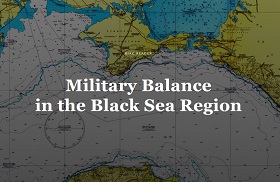
Military Balance in the Black Sea Region
Today, we can also say that Russia does not pay sufficient attention to cooperation in the Black Sea region. As a result, joint exercises of regional states and NATO member states without Russia’s participation have become increasingly frequent precedents. The trend for rapprochement between the North Atlantic Alliance and Black Sea region states in their efforts to maintain security is further confirmed by the latter’s official documents. They speak with increasing frequency about the need for rapprochement with NATO and the EU (as do the documents, for instance, of Bulgaria and Romania) and taking a stand against Russia (as do the documents of Ukraine).
Ignoring the recent challenges in the Black Sea region, Russia is increasingly losing out to NATO in matters of influencing the region. To expand its cooperation with Bucharest, Sofia, Kiev and Tbilisi, Russia needs to add “strategic depth” to inter-country relations. That is, despite the political situation, work should be launched on strategic elements of the relations that would buttress security in the region. Pre-emptive measures are required to prevent the situation from deteriorating into a severe escalation and the existing conflicts from unfreezing. Working along the lines of track 2 diplomacy can offer opportunities for achieving greater understanding between parties.
For NATO members that are also countries of the Black Sea region, maintaining special relations with Russia appears important. Despite the desire of several Black Sea region states to demonstrate NATO’s expanded role in the region, it appears it would be appropriate for Black Sea region countries to approve such steps.
1. Turkish Ministry of National Defence (MND), Defense White Paper 2000 (MND: Ankara, Aug. 2000).
(votes: 4, rating: 5) |
(4 votes) |
Black Sea: Russia, NATO members, ‘Shared Neighborhood’ and non-regional actors



